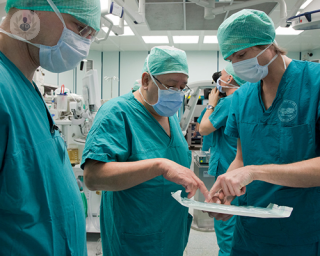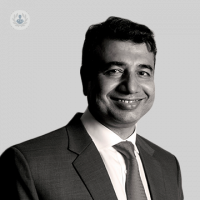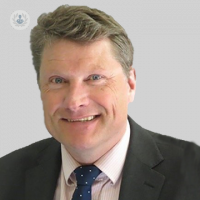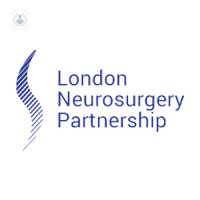Spinal cancer
Mr Navin Furtado - Neurosurgery
Created on: 11-13-2012
Updated on: 07-26-2023
Edited by: Carlota Pano
What are spinal tumours?
Spinal tumours are abnormal growth of cells on the vertebrae. Cancerous tumours of the spine are not very common, however, the spine does have other more frequent types of cancer that affect it. One in four cancer patients develop a tumour that metastises in the spine, which causes pain and possible functional injuries.
Not all spinal tumours are cancerous. There are three types of tumour, which are:
- Spinal, primary, and metastatic tumours
- Intramedullary tumours that develop in spinal cord cells
- Extramedullary tumours that develop in the network of cells surrounding the spinal cord.

Prognosis
Spinal tumours may compress the medulla or the nerves. This results in a loss of movement and limb sensitivity. The tumour can sometimes be fatal, depending on where it is located, which is why early detection is so important.
What are the symptoms?
Spinal tumours can cause a variety of symptoms, especially if they grow. They can affect the spine, nerve roots, blood vessels, and the bones surrounding the spine.
Some common symptoms include:
- Pain near the tumour
- Back pain that usually gets worse at night
- Loss of muscle sensitivity, particularly around the joints
- Difficulty walking
- Affected sensitivity
- Paralysis in parts of the body
Medical tests
An MRI scan is quite often used to check the progression of the tumour. This test is useful for diagnosing the tumour early on, which means that chances of not interrupting spinal functions are higher. X-rays are useful to rule out other degenerative conditions or fractures caused by the tumoural invasion, but they do not play a key role in diagnosing these types of tumour.
A CT scan or a biopsy can be carried out to rule out a spinal tumour or help determine its location.
What causes them?
Spinal tumours are not very common, and the reason for them is unknown. Some specialists believe that genetics may play a role in developing tumours, although it is not clear if these faulty genes are inherited or if they develop over time.
How can they be prevented?
These types of tumour tend to be treated quickly to avoid central nervous system damage. Early detection is the best prevention.
What is the treatment?
The main aim of the treatment is to get rid of the tumour. The main option is normally to remove the tumour by surgery. Depending on the method used, it can be a challenging surgery. If this is not enough or the tumour cannot be completely removed, then other treatments will be considered. These include radiotherapy and chemotherapy.
What specialist should I see?
A neurosurgeon is the specialist who tries to prevent, who diagnoses, assesses, and treats issues of the central and peripheral nervous system. These conditions may sometimes require surgery.













